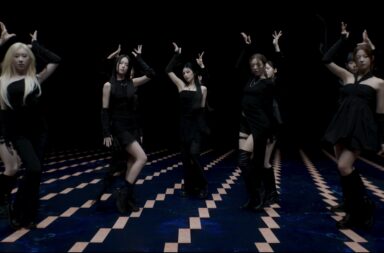 Less than a month after making her solo debut with “I Just Wanna Dance”, Tiffany is back with “Heartbreak Hotel”, a single released as part of SM Entertainment‘s ongoing SM Station project.
Less than a month after making her solo debut with “I Just Wanna Dance”, Tiffany is back with “Heartbreak Hotel”, a single released as part of SM Entertainment‘s ongoing SM Station project.
On the whole, Tiffany’s debut mini and title track weren’t bad, but they did little to carve out a vocal niche for her and differentiate her as a solo artist. Thankfully, “Heartbreak Hotel” is a cut above, although this makes me wonder why Tiffany’s solo couldn’t have been scheduled later—say after EXO‘s promotions end—to include it. It’s darker than the tracks on I Just Wanna Dance, but it wouldn’t have sounded out of place.
Like “I Just Wanna Dance”, “Heartbreak Hotel” displays 1980s influences, but the mid-tempo synths here are paired with single, resonating piano chords to achieve a heavier and more melancholic tone. It leans more towards contemporary R&B than dance. Entrancing details such as organ-like opening chords give off a mysterious, glamorous vibe. It has a quality unlike anything I’ve heard from the Korean music scene so far; perhaps Mario‘s “Damage” (featuring SPICA‘s Boa) comes close, but it has a faster tempo and is more hard-hitting than pensive.
The song takes on the familiar topic of break-ups through the metaphor of travel. The mental and emotional state that Tiffany finds herself in post-break-up is conceptualised as a “heartbreak hotel”. A hotel suggests impermanence—a place one stays in temporarily on a journey (the relationship) and leaves eventually (after the relationship ends). Yet the lyrics suggest that closure isn’t so easy to attain. There is a struggle between the desire to leave and the fact that she is still staying:
Today, I’m checking out
I wanna leave this place (heartbreak hotel)
No I ain’t gonna go
No I ain’t gonna go
 The song is understated, adopting a weary tone to evoke the drained state that follows an outburst of intense emotion. Although the idea is to convey contained sorrow, a tad more emoting in the delivery might have gripped listeners better. The final chorus in particular feels a little lacking after the build-up of Simon D‘s rap. Nonetheless, Tiffany’s warm, full, and bright voice shines here.
The song is understated, adopting a weary tone to evoke the drained state that follows an outburst of intense emotion. Although the idea is to convey contained sorrow, a tad more emoting in the delivery might have gripped listeners better. The final chorus in particular feels a little lacking after the build-up of Simon D‘s rap. Nonetheless, Tiffany’s warm, full, and bright voice shines here.
The lyrics, which Simon D contributed to, uses relatively plain language, but the magic is in the details. Like the MV, it hints at the other side of the story by swapping the pronouns in the otherwise identical lines, “I’ll be gone / You can’t hurt me now” and “You’ll be gone / I can’t hurt you now”. Other evocative touches include the parallelism and half-rhymes in lines like “It endlessly shakes me up [heundeureo], messes me up [heongkeureo]”.
Much like the song, the MV has a deceptively familiar setup, but surprises with the different nuances that emerge with each time it is watched. It did not resort to common dramatics in MVs about heartbreak in order to express the emotional aftermath of a breakup. There’s no screaming or fighting. There isn’t even crying, just haunting, hurt-filled expressions. This is not to say that such behaviour doesn’t or shouldn’t occur, but it is used so frequently and undiscerningly in music videos that it often loses artistic value and emotional impact.
 The MV is set in a literal hotel, with a dark colour scheme befitting the melancholic atmosphere of the song. It opens with cross-cutting between shots of Tiffany descending a narrow stairway and her love interest walking down a similarly narrow corridor. The scenes of Tiffany meeting her soon-to-be boyfriend are tinged with red and pink lights that create a hazy, dreamlike effect, emphasised by the use of slow-motion and soft focus, and the lilting motion of the camera. The outcome is artfully sultry without having to use any explicit images, yet it is also sombre, maintaining the dark tone of the song even as the scenes portray sweeter moments between the couple.
The MV is set in a literal hotel, with a dark colour scheme befitting the melancholic atmosphere of the song. It opens with cross-cutting between shots of Tiffany descending a narrow stairway and her love interest walking down a similarly narrow corridor. The scenes of Tiffany meeting her soon-to-be boyfriend are tinged with red and pink lights that create a hazy, dreamlike effect, emphasised by the use of slow-motion and soft focus, and the lilting motion of the camera. The outcome is artfully sultry without having to use any explicit images, yet it is also sombre, maintaining the dark tone of the song even as the scenes portray sweeter moments between the couple.
The rest of the MV doesn’t show what went awry, opting instead for impressionistic flashes of Tiffany packing her suitcase and gazing blankly ahead, recalling happier moments in the relationship. The neon lights from outside her hotel room window flicker in time with the echoing synths in Simon D’s rap verse, suggesting the emotional turmoil she is experiencing.
 The final sequence brings us back to the club where the couple met, but this time it is leeched of colour, steeped in greys and harsh lighting to reflect the disenchantment and hurt as the pair see each other checking out someone else. The MV shifts so subtly to the perspective of Tiffany’s ex that it took me a few watches to realise that the sequence of flashbacks accompanying the final chorus was not mere repetition, but rather the ex-boyfriend hung up on the same memories.
The final sequence brings us back to the club where the couple met, but this time it is leeched of colour, steeped in greys and harsh lighting to reflect the disenchantment and hurt as the pair see each other checking out someone else. The MV shifts so subtly to the perspective of Tiffany’s ex that it took me a few watches to realise that the sequence of flashbacks accompanying the final chorus was not mere repetition, but rather the ex-boyfriend hung up on the same memories.
Overall, “Heartbreak Hotel” MV reminds me of Seo In-guk’s “Seasons of the Heart”, which took second place on my list on the mid-year review. It takes a familiar premise but puts its own spin on the execution, producing a heartfelt, artfully portrayed narrative that meticulously conveys the muted sorrow of the song.
Song Rating: 4.1/5
MV Rating: 4/5
Readers, what did you think of “Heartbreak Hotel”? What are your favourite SM Station releases so far?
(SMTown via YouTube, Images via SM Entertainment, Lyrics via pop!gasa, K-pop Vocal Analysis, The Bias List)


